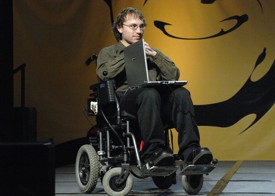|
|
||||
Callahan apparently began his quest for the technology with a mind-controlled computer mouse project while he was still an undergrad, hoping to apply his undoubtedly considerable engineering skills to his passion of neuroscience. Then came the Audeo, which works by using high tech signal processing to capture neurological signals – by which I mean thoughts – and through technological tricks I don't begin to understand, translate those thoughts into actual speech.
From there, the speech can be used in various other manners and technologies that could exploit speech recognition, such as the example I mentioned above where they used it to operate a wheelchair, a video of which is viewable at the website www.theaudeo.com. But it doesn't have to help a person operate machinery – it can be used merely to help bring speech to people who can't speak for whatever reason.
Think about it: as long as a person can think, a person could speak.
Of course, the irreverent part of me wonders if there's (or will be) an application somewhere that can make "non-handicapped" people think before they speak. That could have even more wide-ranging benefits for humanity! But I digress….
If the Audeo can live up to its potential, people who have no motor skills at all could be able to communicate more efficiently, with no physical motion, than famed scientist Stephen Hawking can through the use of his finger, freeing many more minds from the prisons of their bodies.
Who knows what marvelous stuff is waiting to be communicated from those brains?
Jim Bray's columns are available through the TechnoFile Syndicate.
 Audeo Innovation Hopes to Free Trapped Minds
Audeo Innovation Hopes to Free Trapped Minds